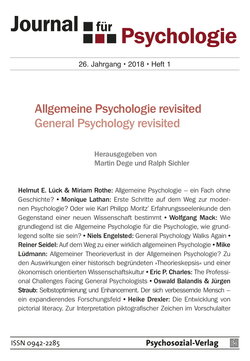Niels Engelsted
General Psychology Walks Again (PDF)
Sofortdownload
Dies ist ein E-Book. Unsere E-Books sind mit einem personalisierten Wasserzeichen versehen,
jedoch frei von weiteren technischen Schutzmaßnahmen (»DRM«).
Erfahren Sie hier mehr zu den Datei-Formaten.
Dieser Artikel hat zwei Teile und erklärt die Rolle, Wichtigkeit und grundsätzliche Ordnung der Allgemeinen Psychologie. Der erste Teil wird wie eine Schauergeschichte erzählt; wir durchqueren die lange Geschichte der Allgemeinen Psychologie und ihre typische Abwesenheit, also die Krise der Psychologie. Auf der Basis der Theorien von George Henry Lewes, Herbert Spencer, Karl Bühler, und Lev Vygotsky und anderen werden Voraussetzungen genannt, die der Autor für Notwendig für eine Allgemeine Psychologie hält. Aufbauend auf Aristoteles Taxonomie der Bio-Psychen wird vorgeschlagen, Psychologie in vier Unterka--shy--tegorien zu unterteilen, die jeweils erklärungsbedürftig sind. In evolutionärer Rangfolge: Bewusstheit, die das psychologische Präsens bzw. das Jetzt setzt. Intentionalität, die die Zukunft erschafft. Gedächtnis (mind), das die Vergangenheit erschafft. Menschliches Bewusstsein, das den Blick von Außen ermöglicht. Intentionalität wird zum zweiten Hauptsatz der Thermodynamik in Beziehung gebracht. Gedächtnis wird mit REMS bei Säugetieren verbunden. Menschliches Bewusstsein wird mit einem neuen Verständnis der menschlichen Evolution in Beziehung gesetzt, in dem alle definitorischen Eigenschaften des Menschen – Gesellschaft, Bewusstsein und Sprache – zusammengefasst werden.
Abstract:
Explaining the role, importance, and basic layout of general psychology, the paper has two parts. In the first part, told as a ghost story, we visit the long history of general psychology and its usual absence, aka the crisis of psychology. Drawing on the insights of among others George Henry Lewes, Herbert Spencer, Karl Bühler, and Lev Vygotsky, a number of requirements are listed that the author believes are necessary for a general psychology. In the second part is sketched the author’s proposal for such a general psychology. Built on Aristotle’s taxonomy of bio-psyches, the proposal divides psychology into four subdomains, each in need of explanation. In evolutionary sequence: Sentience, which posits the psychological present moment or now. Intentionality, which posits the future. Mind, which posits the past. Human consciousness, which posits the view from without. Sentience remains unexplained. Intentionality is linked to the second law of thermodynamics. Mind is linked to REMS in mammals. Human consciousness is linked to a new understanding of human evolution in which all the defining attributes of the human being – society, consciousness, and language – arrive all at once and together.
Abstract:
Explaining the role, importance, and basic layout of general psychology, the paper has two parts. In the first part, told as a ghost story, we visit the long history of general psychology and its usual absence, aka the crisis of psychology. Drawing on the insights of among others George Henry Lewes, Herbert Spencer, Karl Bühler, and Lev Vygotsky, a number of requirements are listed that the author believes are necessary for a general psychology. In the second part is sketched the author’s proposal for such a general psychology. Built on Aristotle’s taxonomy of bio-psyches, the proposal divides psychology into four subdomains, each in need of explanation. In evolutionary sequence: Sentience, which posits the psychological present moment or now. Intentionality, which posits the future. Mind, which posits the past. Human consciousness, which posits the view from without. Sentience remains unexplained. Intentionality is linked to the second law of thermodynamics. Mind is linked to REMS in mammals. Human consciousness is linked to a new understanding of human evolution in which all the defining attributes of the human being – society, consciousness, and language – arrive all at once and together.
Martin Dege & Ralph Sichler S. 3–8Editorial (PDF)
Helmut E. Lück & Miriam Rothe S. 9–29 (PDF)
Monique LathanS. 30–48 (PDF)
Wolfgang MackS. 49–73 (PDF)
Niels EngelstedS. 74–96General Psychology Walks Again (PDF)
Reiner SeidelS. 97–122 (PDF)
Mike LüdmannS. 112–122 (PDF)
Eric P. CharlesS. 123–130The Professional Challenges Facing General Psychologists (PDF)
Oswald Balandis & Jürgen Straub S. 131–155Selbstoptimierung und Enhancement (PDF)
Der sich verbesserndeMensch - ein expandierendes ForschungsfeldHeike DrexlerS. 156–177 (PDF)
Helmut E. Lück & Miriam Rothe S. 9–29 (PDF)
Monique LathanS. 30–48 (PDF)
Wolfgang MackS. 49–73 (PDF)
Niels EngelstedS. 74–96General Psychology Walks Again (PDF)
Reiner SeidelS. 97–122 (PDF)
Mike LüdmannS. 112–122 (PDF)
Eric P. CharlesS. 123–130The Professional Challenges Facing General Psychologists (PDF)
Oswald Balandis & Jürgen Straub S. 131–155Selbstoptimierung und Enhancement (PDF)
Der sich verbesserndeMensch - ein expandierendes ForschungsfeldHeike DrexlerS. 156–177 (PDF)

